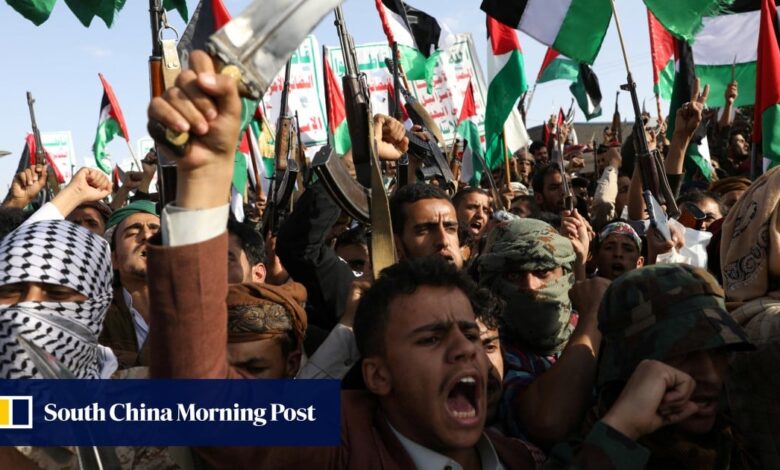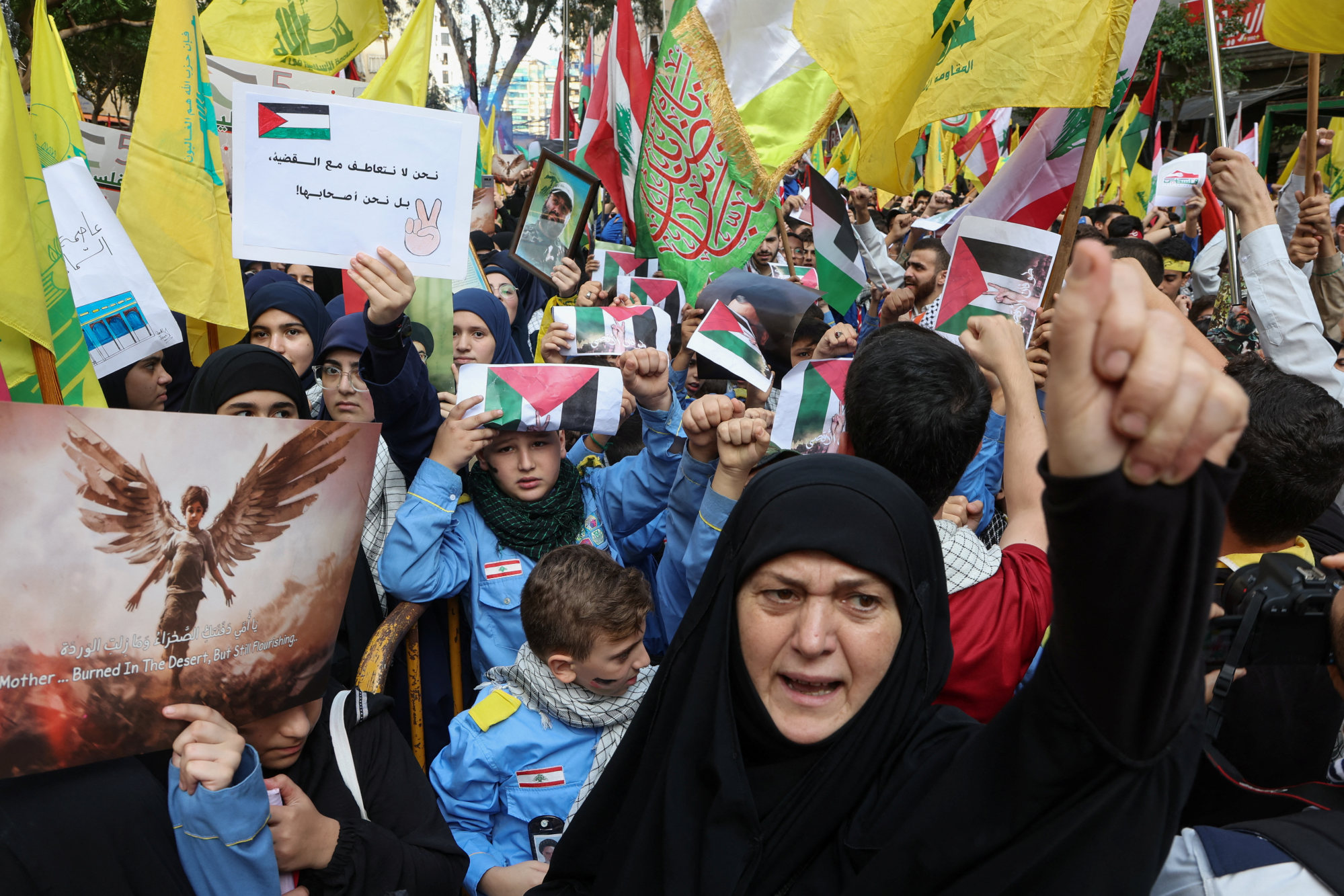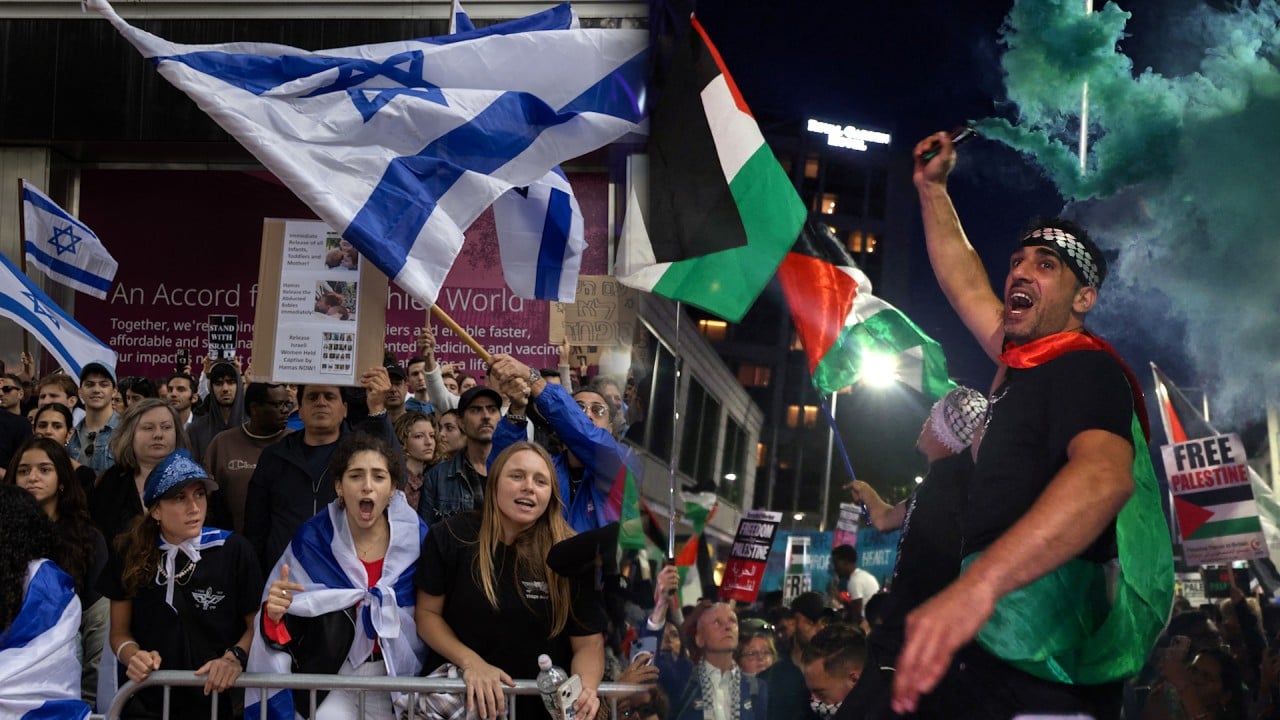Israel-Gaza war: hospital blast revives ‘Palestinian cause’ as anger spreads across Mideast, threatening to widen conflict

Protesters in Jordan – home to millions of Palestinian refugees – tried to storm the Israeli embassy.
In Lebanon, demonstrators clashed with security forces outside the US embassy. Stones were hurled and a building was set on fire.
The US State Department authorised the departure of “some non-emergency” personnel from the Beirut embassy, citing the “unpredictable security situation.”
Hezbollah, Lebanon’s powerful Iran-backed militant group, vowed a “day of rage” on Wednesday.
Thousands of people demonstrated across Egypt on Wednesday in solidarity with Gaza after 12 days of Israeli bombardment, Egyptian media reported.
President Abdel Fattah al-Sisi had said that if he called for protests in support of the Palestinian cause, “you would see millions” on the streets of Egypt – where protests are banned.
The horror of events at Ahli Arab Hospital and the swift backlash threatened to derail Biden’s high-stakes visit to the Middle East.
Egypt’s Sisi, King Abdullah II of Jordan and Palestinian President Mahmoud Abbas – friends of the US who normally relish the chance to meet with American presidents – called off a planned Wednesday summit with Joe Biden, who will now only visit Israel.
This war, which has entered a dangerous phase, will plunge the region into an unspeakable disaster
US Secretary of State Antony Blinken spent much of the past week meeting with Arab leaders to try to keep tensions in check, but those efforts are now in doubt following the hospital blast. The raw nerve of decades of Palestinian suffering, left exposed by US-brokered normalisation agreements between Israel and Arab states, is throbbing once again, threatening broader unrest.
“This war, which has entered a dangerous phase, will plunge the region into an unspeakable disaster,” warned Abdullah, who is among the closest Western allies in the Middle East.
Gaza’s Hamas-run Health Ministry said an Israeli air strike caused the hospital blast, while Israel blamed it on a rocket fired by the militant Islamic Jihad group that fell short. Biden echoed the Israeli view after arriving in Tel Aviv, saying the blast appeared to have been caused “by the other team, not you,” but that there were “a lot of people out there” who weren’t sure.
There was no doubt among the Arab protesters who gathered in several countries late on Tuesday to condemn what they saw as an Israeli atrocity.
In the Israeli-occupied West Bank, which has been under lockdown since a bloody October 7 rampage by Hamas militants ignited the war, protesters clashed with Palestinian security forces and called for the overthrow of Abbas.
Israel and the West have long viewed Abbas as a partner in reducing tensions, but his Palestinian Authority is widely seen by Palestinians as a corrupt and autocratic accomplice to Israel’s military occupation of the West Bank.
Jordan, long considered a bastion of stability in the region, has seen mass protests in recent days. Late on Tuesday, pro-Palestinian protesters tried to storm the Israeli Embassy.
US officials warn of Israel war on two fronts, Iran involvement
US officials warn of Israel war on two fronts, Iran involvement
“They are all normalising Arab rulers, none of them are free, the free ones are all dead!” one protester shouted. “Arab countries are unable to do anything!”
Egypt was the first Arab country to make peace with Israel, in the late 1970s. Jordan followed in 1994.
Thousands of students rallied at Egyptian universities on Wednesday to condemn Israeli strikes on Gaza. Protesters in Cairo, Alexandria and other cities chanted “Death to Israel” and “With our souls, with our blood, we sacrifice for you, Al-Aqsa,” referring to a contested Jerusalem holy site. A smaller protest was held near the US Embassy in Cairo on Tuesday.
Egypt has not seen large protests since the latest Hamas-Israel war started; authorities have waged a heavy crackdown on dissent for over a decade. But fears that Israel could push the Gaza Strip’s 2.3 million residents into Egypt’s Sinai Peninsula, and soaring consumer prices amid runaway inflation could prove a volatile combination where a popular uprising toppled a US-backed autocrat in 2011.
Protests also erupted in Lebanon, where Hezbollah has traded fire with Israeli forces at the border, threatening to enter the war with its massive arsenal of rockets, and as far away as Morocco.
“The Arab street has a voice. That voice may have been ignored in the past by governments in the region and the West … but they cannot do this any more,” said Badr al-Saif, a history professor at Kuwait University. “People are on fire.”
As recently as a couple of weeks ago, the regional outlook seemed far different.
In his address to the UN General Assembly last month, Israeli Prime Minister Benjamin Netanyahu boasted that the Abraham Accords, the agreements in which four Arab states normalised relations with Israel in 2020, were a “pivot of history” that “heralded the dawn of a new age of peace.”
As thousands suffer in Israel-Hamas war, only one country benefits
As thousands suffer in Israel-Hamas war, only one country benefits
He said Israel was “at the cusp of an even more dramatic breakthrough” – a historic agreement with Saudi Arabia that the Biden administration had been focused on in recent months.
The Abraham Accords, with the United Arab Emirates, Bahrain, Morocco and Sudan, were reached with autocratic leaders willing to set aside the Palestinian issue to secure their own benefits from the US. The UAE hoped for advanced fighter jets. Morocco won US support for its claim to disputed Western Sahara, and Sudan’s ruling military junta got long-standing US sanctions lifted.
Saudi Arabia had asked for a US defence pact and aid in establishing a civilian nuclear programme, as well as a substantial concession to the Palestinians that the Saudis have yet to publicly spell out.

But despite all the high-level diplomacy, ordinary Arabs and Muslims still express strong solidarity with the Palestinian cause. During last year’s World Cup soccer tournament, for example, Palestinian flags were waved in abundance even though the national team did not compete.
The recent devastation in Gaza has stirred those sentiments again, likely giving pause to the Saudis and other governments that were considering normalisation.
“No Arab government is able to extend its hand to Israel amid its aggression on the Palestinians,” Ammar Ali Hassan, an Egyptian political scientist, said.
“The Arab peoples won’t accept such a move. Even the rulers wouldn’t benefit from such ties at this time,” he said. “The war on Gaza has revived the Palestinian cause.”






